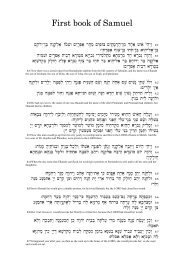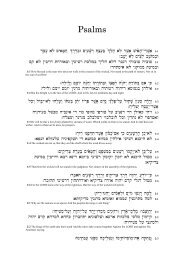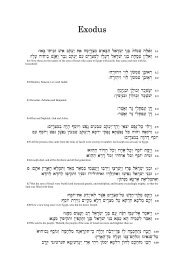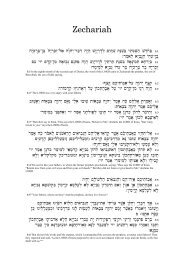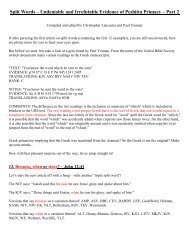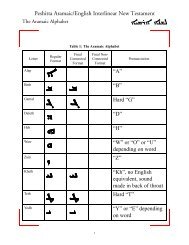ana translation
Untitled - Peshitta Aramaic/English Interlinear New Testament
Untitled - Peshitta Aramaic/English Interlinear New Testament
- No tags were found...
You also want an ePaper? Increase the reach of your titles
YUMPU automatically turns print PDFs into web optimized ePapers that Google loves.
3JOH. 10] SUPPLEMENTAL NOTES. 125<br />
Thus the twofold perversion is accounted for, by which the true text as<br />
in the Polyglots,<br />
(and so Etzel before them, " quandocunque venero<br />
recordabor") with 1|>, first pers. fut. pe., and jOll}, first pers. fut.<br />
aph., has been corrupted into that of 8 and Pococke, followed by<br />
Gutbir and all later editors, except Lee and the American though<br />
Pococke (see<br />
his note in Zoc.)<br />
had pointed out its doubtfulness.<br />
As regards (a), however, it is to be added that 1 (as also 17 and<br />
19) writes ^Z^J apparently representing ZXOrj while they retain the<br />
true jOTlf, giving thus a reading lav fXBy, inrofj.vrja^ which is intelligible,<br />
though otherwise unsupported. As regards (6), the two copies<br />
above excepted, 9, 18, agree with 8 in dropping the preformative 1,<br />
but with the verb in plur., O JO1L. Both, however, write ]i]y (<br />
~ ]1] j),<br />
as if reading cav 2A.0W, vTro/xv^o-^re unmeaningly. Arab, also represents<br />
virofjivrjarOTjTf,<br />
but (more consistently) with lav ZXOy preceding.<br />
But it is not always clear what tenses and persons are indicated by<br />
the points in our copies, and this caution applies especially to 1 and<br />
its reading<br />
]L\J.<br />
Harkl. has |J| jOllSD |2( .(, apparently intending the same sense<br />
*<br />
^fc \<br />
as our text. Though \L\ might stand (in<br />
it and in some of our<br />
codices) for |Z| (ptcp. poel), it can hardly be so meant, for the ptcp.<br />
would be ambiguous as between the meanings !A.0u> and eA.%, and a<br />
personal pronoun would be required after it (whether ]j] or OO1).<br />
Ib. The reading of all the editions, Polyglots included, J^CO (<br />
= eVtcrK7TTo/xfos,<br />
or (as tier. 5 supr.) e/jya^o/^evos),<br />
is untenable.<br />
It is attested<br />
by but five, most of them untrustworthy, copies (4, 7, 8, 10, 15). It<br />
is unsuited to the context, it can hardly be construed at all, and it in no<br />
wise represents the Gr. Xvapuv,<br />
which (though a-n-. Xey. here in N.T.,*<br />
and abnormally used as an act. verb [C subjoins eiY])<br />
is the undisputed<br />
reading of the Gr. authorities.<br />
to propose conjecturally the correction<br />
Dr. Field seems to have been the first<br />
)Acb, which stands in place of<br />
JAQQ in Harkl. Elsewhere, = >AflD usually /caToAv'co (as in Pesh. N.T.<br />
often, and in Harkl. now and then) ;<br />
but in Syr.-Hxp.<br />
it is the<br />
rendering of 7rapa\a\u (as Ps. xliii [xliv] 17 [16], and of KaraXaXw,<br />
Mai. iii.<br />
13, 16).<br />
In this sense it<br />
may be accepted as fairly representing<br />
, understood as " to prate maliciously [against]."<br />
This correction<br />
is now amply verified by the evidence of all our copies of Philox. except<br />
* But we have \vapos, 1 Tim. v. 13.



